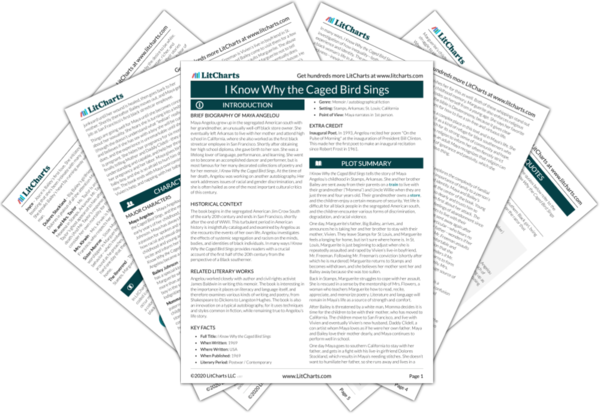Marguerite finds refuge in fiction, poetry, and language itself. The book is in many ways an account of how Maya Angelou came to be a poet, and her love of language plays a central role.
Marguerite is a quiet child, and especially after her assault, learns to take refuge in the sound and quality of others’ speech. She is told by her Uncles in St. Louis that it is okay if she is ugly so long as she is smart. Though her love of language is genuine (and even innate) it is also buoyed by a sense of obligation; because she is not pretty, she must be well read. Her subsequent relationship with Mrs. Flowers—an educated woman who teaches Marguerite how to read, memorize, and appreciate poetry—is one of the most formative in her entire childhood.
The “singing” of the caged bird is analogous to the refuge that Maya Angelou finds in language and poetry. The world in which she grows up is an unforgiving one, always unfair, and often brutal. The author’s appreciation and love of language as an art form is presented as a kind of salvation. In a book so rife with both racial and sexual violence, it is fitting that speech, communication, art and language would be advocated for.
Language ThemeTracker

Language Quotes in I Know Why the Caged Bird Sings
The white kids were going to have a chance to become Galileos and Madame Curies and Edisons and Gauguins, and our boys (the girls weren’t even in on it) would try to be Jesse Owenses and Joe Louises.
I wouldn’t miss Mrs. Flowers, for she had given me her secret world which called forth a djinn who was to serve me all my life: books.
Miss Kirwin never seemed to notice that I was Black and therefore different.
The Black man, the con man who could act the most stupid, won out every time against the powerful, arrogant white.
















